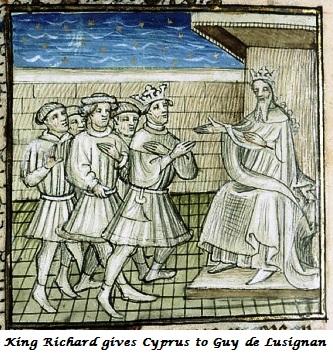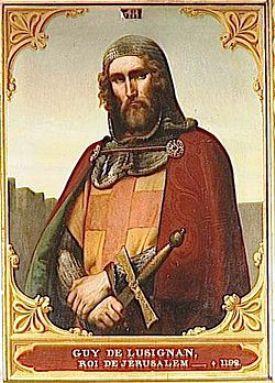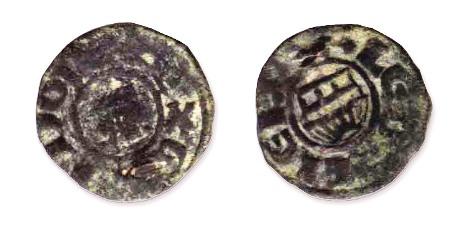PATRIMUNDIA The Cultural Heritage of North Cyprus
LUSIGNAN PERIOD : 1192 - 1205
LUSIGNAN PERIOD
1192 - 1205
The three hundred years (1192 – 1489) during which the kings and queens of the House of Lusignan held sway over Cyprus constituted the most brilliant epoch in its history. It was, however, entirely a foreign, i.e. a Latin, brilliance.
In May 1192, the Templars begged Richard Coeur de Lion to resume the island on the same terms as he had sold it; but Richard, who was not prepared to restore the 40000 bezants, induced Guy de Lusignan to acquire the island as some compensation for the loss of his kingdom of Jerusalem, the shadowy sovereignty over which had been transferred to Richard’s nephew, Henry de Champagne.
At this point Guy de Lusignan was given control of Cyprus in return for 60000 bezants cash down . Guy de Lusignan assumed the title of Lord of Cyprus (1192 – 1194).
The Lusignans came from Poitou in France, they were an ancient family with the odd distinction of a legendary mermaid, Melusine, as an ancestress. There is an ambiguous depiction of her on the doorway of Ste Catherine’s church, Nicosia. Later on she was turned into a flying dragon (Church of Ayios Thirsos).
In the last years of the 12th century there were many dispossessed knights or their widows in Palestine, there lands had fallen to Saladin and his forces, and such people were invited to Cyprus by Guy to colonise it. Although he had been despised by the Crusaders in Syria, his provisions for Cyprus were tolerant and wise.
The conditions of Cyprus on the arrival of Guy was pitiable, for the tyranny of Isaac Comnenus followed by the massacre of Nicosia by the Templars had driven the better-class inhabitants from the island. The public domains, largely increased by the confiscations of Isaac and by the flight of landholders, were employed to provide estates for the knights. But Guy was anxious to gain the sympathy of the natives and did his best to remedy the depopulation from which Cyprus had suffered. He proclaimed in the adjoining countries that their estates would be restored to those Cypriots who returned to claim them within a fixed period, and he also invited settlers from Syria and surrounding districts.
The nobility and the landed class of the new Cyprus consisted of 300 nobles and knights and 200 squires, to whom Guy granted estates of land, including the Cypriot peasants who lived upon them. After these, came the traders and artisans who had come from Europe.
Guy de Lusignan died in 1194. His brother and successor, Aimery, obtained the right to a royal crown from the emperor Henry VI. Aimery (1194-1205) governed well. However he did two apparently sensible things which were to bring much trouble in the future. He allowed the Latin Church to reorganise the ecclesiastical affairs of the island; another was the sophisticated feudal system which was modelled on what had been worked out for the kingdom of Jerusalem. Gradually, it has been claimed, a great wedge was driven between the natives and the Frankish settlers.
The governing body of Frankish nobles was known as the ‘Haute Cour’. The kingdom’s constitution was the model of that of the medieval feudal state; its laws, as embodied in the ‘Assizes of Jerusalem’, a pattern of medieval jurisprudence. But local laws and customs were retained.
To secure his position from without and within Aimery extended the mountain castles of St Hilarion, Buffavento and Kantara. Alexios III, who had usurped the throne of Constantinople, designed to recover Cyprus to the Eastern Empire.
The Orthodox clergy and laity were indignant at the establishment of the Latin Church and at the spoliation of their ecclesiastical revenues. Aimery, on the eve of his departure to Palestine to assume the crown of Jerusalem, assembled the heads of two churches and endeavoured to persuade them to live at peace and to devote themselves to the welfare of their respective flocks. However, a rebellion of Orthodox population broke out under the leadership of Kanakes who attacked the property of the Franks. Kanakes made a descent upon the village of Paradisio and carried off the Queen and her family.
As the result of the Fourth Crusade, Baldwin, Count of Flanders, became the first Latin emperor of Constantinople. The effect on Cyprus was to sever finally her political connection with Constantinople and to cause her to depend for support on the naives of the Western Powers. Such a situation could last only so long as it remained to the interests of the Western Powers to support the kingdom of Cyprus, either as an outpost of the Crusaders or as an emporium for trade with the East.
ADVERTS :
Recipes From Around The World
Bring the exotic tastes of other countries into your home with Recipes From Around The World
Make a free website with emyspot.com - Report abuse


























